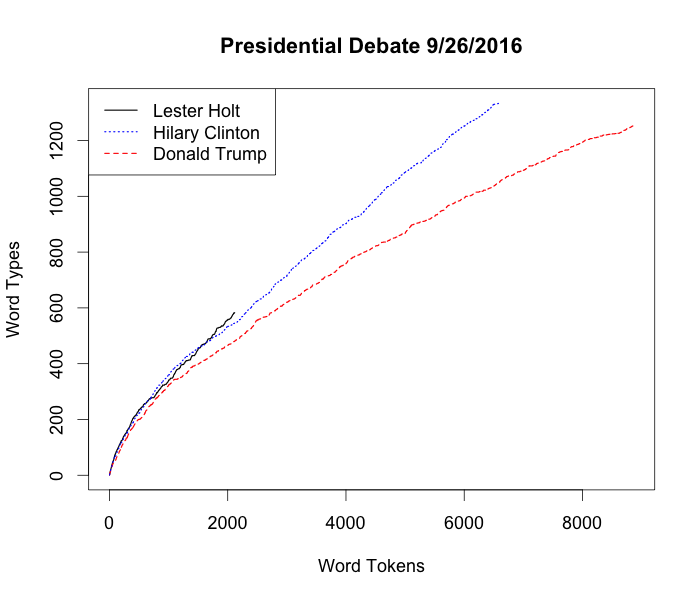September 29, 2016 @ 6:28 pm
· Filed by Victor Mair under Alphabets, Borrowing, Language and art, Writing systems
A little over a year ago, we had our first look at "Konglish", Korean-style English. If it was thriving then, it seems to be positively luxuriant now:
"The Beauty and Perils of Konglish, the Korean-English Hybrid" (Margaret Rhodes, WIRED, 9/29/16)
Read the rest of this entry »
Permalink
September 29, 2016 @ 4:07 pm
· Filed by Geoffrey K. Pullum under Computational linguistics, Humor, Language and computers, Prescriptivist poppycock, Usage advice
Let me explain, very informally, what a predictive text imitator is. It is a computer program that takes as input a passage of training text and produces as output a new text that is composed quasi-randomly except that it matches the training text with regard to the frequencies of word or character sequences up to some fixed finite length k.
(There has to be such a length limit, of course: the only text in which the word sequence of Melville's Moby-Dick is matched perfectly is Melville's Moby-Dick, but what a predictive text imitator trained on Moby-Dick would do is to produce quasi-random fake-Moby-Dickish gibberish in which each sequence of not more than k units matches Moby-Dick with respect to the transition probabilities between adjacent units.)
I tell you this because a couple of months ago Jamie Brew made a predictive text imitator and trained it on my least favorite book in the world, William Strunk's The Elements of Style (1918). He then set it to work writing the first ten sections of a new quasi-randomly generated book. You can see the results here. The first point at which I broke down and laughed till there were tears in my eyes was at the section heading 'The Possessive Jesus of Composition and Publication'. But there were other such points too. Take a look at it. And trust me: following the advice in Jamie Brew's version of the book won't do your writing much more harm than following the original.
Read the rest of this entry »
Permalink
September 29, 2016 @ 11:17 am
· Filed by Geoffrey K. Pullum under Humor, Language and culture, Language and travel, Language attitudes, Language contact, Politics of language, Silliness, Sociolinguistics, Speech-acts
Please, talk to each other. It's important to linguists that there should be plenty of chat. We need language live, on the hoof. Millions of spoken word tokens everywhere, so that we can (for example) compare Donald Trump's amazingly high proportion of first-person singular pronouns to the average for non-narcissists like typical Language Log readers. 
However, beware of engaging in chat to strangers on the subway if you are in London. A new campaign for people to wear a "Tube chat?" button when traveling on London Underground trains, intended to provoke random conversation with other passengers, has been met with horror and disdain by the misanthropic curmudgeons who use the services in question. No chat please; we're Londoners.
[Comments are turned off out of respect for readers in London.]
Permalink
September 28, 2016 @ 5:46 pm
· Filed by Victor Mair under Language and advertising, Names, Numbers, Slang, Topolects
Here we go again:
"Samsung’s Galaxy On7 goes official" (Marketing-Interactive, 9/28/16)
As we’ve covered shortly two weeks ago, the pronunciation of “7″ sounds like “penis” in Cantonese, and the latest Samsung Galaxy On7 launch has once again stirred up discussion on the internet in Hong Kong.
The Cantonese pronunciation of “On9″ [sic: there seems to be a mix-up here] is similar to slang meaning “stupid”, and many are saying the new release is a crossover between the two slang words.
Read the rest of this entry »
Permalink
September 28, 2016 @ 8:55 am
· Filed by Geoffrey K. Pullum under Grammar, Prescriptivist poppycock, Syntax, Writing
The Economist, in a leader last April about the Panama Papers revelation, which I really should have brought to your attention sooner (it fell through the cracks of my life), told us that "The daughters of Azerbaijan's president appear secretly to control gold mines."
They appear secretly? Where are these secret appearances? Are they scheduled in advance, or do they occur randomly? And how would a secret appearance help to control a gold mine?
Read the rest of this entry »
Permalink
September 28, 2016 @ 8:35 am
· Filed by Mark Liberman under WTF
On the fence around a construction site that I walk past every day is this sign:

Read the rest of this entry »
Permalink
September 27, 2016 @ 5:59 pm
· Filed by Victor Mair under Translation
According to these two articles, Google Translate is taking a quantum leap forward in the quality of its services, starting with Mandarin to English:
"Google says its new AI-powered translation tool scores nearly identically to human translators" (Quartz, 9/27/16)
"An Infusion of AI Makes Google Translate More Powerful Than Ever" (WIRED, 9/27/16)
Read the rest of this entry »
Permalink
September 27, 2016 @ 12:56 pm
· Filed by Ben Zimmer under Language and politics, Misnegation
In addition to the many "nots" he uttered in last night's debate, Trump poured on the negations in this tweet today:
Read the rest of this entry »
Permalink
September 27, 2016 @ 11:53 am
· Filed by Mark Liberman under Language and culture
 I don't watch broadcast TV a lot, but over the past couple of days I've experienced more than four hours of live television — which turned out to be a surprisingly positive experience. Sunday afternoon I watched the Philadelphia Eagles play the Pittsburgh Steelers, and Monday evening I watched the first presidential debate.
I don't watch broadcast TV a lot, but over the past couple of days I've experienced more than four hours of live television — which turned out to be a surprisingly positive experience. Sunday afternoon I watched the Philadelphia Eagles play the Pittsburgh Steelers, and Monday evening I watched the first presidential debate.
My expectations for both events were low. I agreed with most Philadelphians in hoping that the Eagles and their rookie quarterback Carson Wentz could avoid embarrassing themselves, and maybe keep it close before losing. And I reckoned that the debate would be a sort of political duel of pro wrestling promos, maybe mixed with some reality-television tropes, where dominance theater would dominate.
Read the rest of this entry »
Permalink
September 27, 2016 @ 8:55 am
· Filed by Ben Zimmer under Language and politics
As Geoff Pullum noted, in last night's presidential debate, many of Trump's interruptions of Clinton (or shall we say his "manterruptions") involved on-the-fly denials of what Clinton was saying. Geoff describes one such denial: "'Not!' he snapped at one point, like a 9-year-old, during one of her utterances."
Let's go to the transcript:
CLINTON: Well, Donald, I know you live in your own reality, but that is not the facts. The facts are — I did say I hoped it would be a good deal, but when it was negotiated…
TRUMP: Not.
https://www.youtube.com/watch?v=d7qpr9rGetU
Read the rest of this entry »
Permalink
September 27, 2016 @ 6:40 am
· Filed by Mark Liberman under Language and politics
Geoff quoted Vox on Donald Trump's interruptions during last night's debate, and discussed the extraordinary childishness of some of those interruptions. I don't have much time this morning, so I'll just add a few words about words.
Trump used 35% more wordforms than Clinton did — 8,866 to 6,580, by my trivial debate-analysis program's count based on the Washington Post's transcript. And as expected based on past performances, Trump repeated himself a lot — a type-token plot shows that Clinton actually used a larger number of distinct words (1,333 to Trump's 1,253), despite using significantly fewer word tokens:

Read the rest of this entry »
Permalink
September 27, 2016 @ 5:15 am
· Filed by Geoffrey K. Pullum under Gender, Language and politics, Mannerisms, Politics of language, Rhetoric, Silliness
It's a bit early for Language Log to do any analysis of the presidential debate last night. Where I live, it came on after 2 a.m., and where Mark lives it is still only 5:15 a.m. right now. But Vox has already analysed the interruption rate, a well-known index of gender in speech style. Trump interrupted Clinton exactly three times as often as she interrupted him. I think Language Log can confidently affirm that here we have convincing linguistic evidence that Trump is male and Clinton is female.
But one other thing I noticed, as I struggled to stay awake in the darkness of the middle of the night here in Edinburgh, with the bedside radio softly relaying the debate via the BBC World Service, was the astonishingly childish nature of many of Trump's interruptions.
Read the rest of this entry »
Permalink
September 26, 2016 @ 8:30 am
· Filed by Victor Mair under Errors, Orthography, Spelling
A smart and generally careful graduate student from China recently handed in an English –> Chinese translation. In checking over his work, I noticed several mistakes, from which I select here a couple of examples. Except in two cases, I won't point out the problems with inappropriate word choice and grammar, but will focus on a particular category of error associated with contemporary Chinese writing.
Read the rest of this entry »
Permalink



